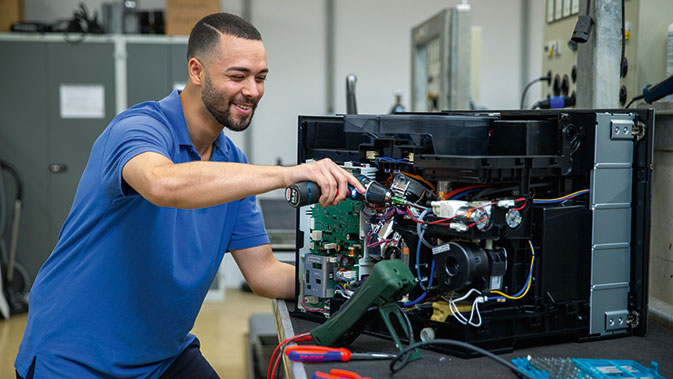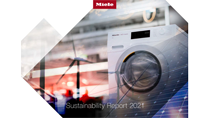Press releases
The circular economy is gaining momentum: exclusive study reveals high level of acceptance for circular domestic appliances

-
Three in four of those surveyed trust appliances made from recycled materials
-
Over 80 per cent would consider refurbished spare parts
-
Price, durability and energy efficiency remain the most important purchase criteria
The majority of consumers trust recycled or refurbished domestic appliances, as an exclusive survey conducted by market research institute Innofact on behalf of Miele reveals. The idea of keeping products and materials in circulation for as long as possible is clearly gaining in importance. And it is also true that the people who buy refurbished products are aiming to save. For the first time, the study investigates what people know about the circularity of domestic appliances such as washing machines, ovens and vacuum cleaners, and how accepting they are of it. A representative selection of 1000 men and women were surveyed at the start of August in Germany.
Although only a fifth (21 %) of consumers are familiar with the term circularity, more than a third correctly associate the term with keywords such as recycling (42 %) or circular economy (41 %). There is therefore an understanding of circular practices, but further clarification of their specific meaning is needed. Irrespective of this, the level of acceptance for circularity is increasing: three quarters of those surveyed would also trust the durability of domestic appliances containing recycled materials (73 %) or refurbished components (65 %).
According to the study, the two most important motivators for adopting circular practices are to produce less waste and to save on resources (both 89 %). Yet despite growing interest, there are some obstacles blocking the way. Almost two thirds of the people surveyed are worried about issues such as quality defects (62 %). Another critical aspect is the limited choice of products available (58 %). By contrast, hygiene concerns (27 %) or time pressure when making a purchase (21 %) play a secondary role: only one in every fifth person would choose to dismiss the topic of the circular economy because they are in a hurry to decide on the right appliance.
Miele is focusing on pilot projects
“Circular practices are less and less of a niche trend – demand is rising. Here at Miele, we are also taking this into account, for example with a series of pilot projects,” says Rebecca Steinhage, an Executive Director, one of whose responsibilities includes sustainability. Since July, Miele has been offering refurbished electronics as an alternative to brand-new spare parts in five European countries. In the Netherlands, Miele tests, repairs and cleans used washing machines and sells them to interested customers with the “refurbished” label. At IFA, the world’s largest consumer electronics and home appliances trade show, Miele will be presenting the concept of a circular cordless stick vacuum cleaner. It has a fully modular design, can be almost completely returned to the material cycle at the end of its life cycle and is made almost entirely from recycled materials.
Men are more likely to opt for brands, women for energy efficiency
The study reveals differences in purchasing behaviour based on gender: women place more value on energy efficiency than men do, while men are more likely to opt for brands than women are. For both genders, however, price (79 %), durability (76 %) and energy efficiency (71 %) are the most important factors when making a purchase decision. Consistent with this, 70 per cent of those surveyed say that it is important for them to be able to repair a domestic appliance themselves if this will enable them to save time and costs. High availability of spare parts is also important. Online explanatory videos are the preferred assistance option when it comes to repairs. Four out of five of the people surveyed (81 %) would also use refurbished spare parts for repairs. In such cases, they say that it would be important for the parts to have a long warranty period (74 %) and be priced appropriately (73 %).
“The vacuum cleaner” is the most common answer when consumers are asked which domestic appliance they would be most likely to consider purchasing if it was made primarily from recycled materials (56 %). This is followed at some distance by the washing machine (41 %). All other appliances included in the survey (cookers, ovens, hobs, dishwashers, coffee machines, refrigerators, tumble dryers) poll more or less even at around 35 per cent. Looking ahead, there is also a clear trend: almost 70 per cent of those surveyed regard the circularity of domestic appliances as an essential factor for the environment and society in the future. And 60 per cent consider this to be true for themselves personally. Rebecca Steinhage adds: “These results spur us on to resolutely pursue the strategic course we have set ourselves.”
Miele at IFA in Berlin
At IFA (September 6 to 10, 2024), Miele can be found in hall 2.1, stand 101 (main stand), and in hall 27, stand 40. At stand 40, Miele will be showcasing highlights including the design study of the aforementioned circular vacuum cleaner – developed in close collaboration with Professor Michael Braungart, co-founder of the cradle-to-cradle principle which aims to achieve a circular economy in which materials remain entirely in the cycle. In addition, Miele Customer Service will be presenting its variety of spare parts and explaining the role that artificial intelligence will play in the maintenance and repair of domestic appliances in the future. There will also be a repair challenge where visitors can try their hand at repairing a washing machine.
Company profile: Miele is recognised as the world's leading supplier of Premium domestic appliances, with an inspiring portfolio for the kitchen, laundry and floor care. The company also offers machines, systems and services for use in hotels, offices, care and medical technology. Since its foundation in 1899, Miele has lived up to its brand promise of "Immer Besser" in terms of quality, innovation, performance and timeless elegance. With its durable and energy-saving appliances, Miele helps its customers to make their everyday lives as sustainable as possible. The company is still owned by the two founding families Miele and Zinkann and has 15 production plants, eight of which are in Germany. Around 22,700 people work for Miele worldwide and the company's most recent turnover was 4,96 billion Euro. The company has its headquarters in Gütersloh in Westphalia.
Dirk Haushalter
+49 5241 89-1027
dirk.haushalter@miele.com
Media information
| Description | Download |
|---|---|

More and more people are repairing their household appliances themselves. According to a Miele survey, four out of five respondents (81%) would be willing to use refurbished spare parts for this as well. |
|
High Resolution JPG |


